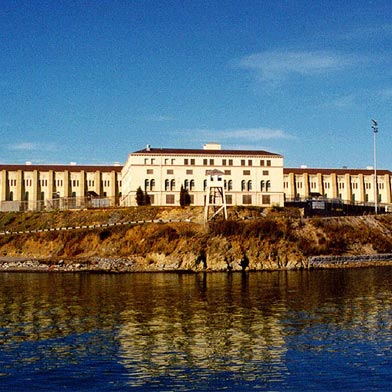 A federal judge is due to tour California’s new execution chamber at San Quentin State Prison this morning as part of his review of a lawsuit challenging the state’s lethal execution procedure.
A federal judge is due to tour California’s new execution chamber at San Quentin State Prison this morning as part of his review of a lawsuit challenging the state’s lethal execution procedure.
U.S. District Judge Jeremy Fogel of San Jose is presiding over a lawsuit in which four death row inmates claim the procedure risks causing unconstitutional extreme pain.
His visit to the death chamber is expected to last about one hour.
Fogel has said he hopes to issue a final ruling on the case this year. He has scheduled a hearing on motions for March 4, and may set additional deadlines or dates at a status conference in his San Jose courtroom on Friday.
California executions have been on hold since Fogel concluded in 2006 that the procedure had numerous flaws, including inadequate training of staff and a poorly lit, overcrowded and badly designed execution chamber.
Fogel issued that ruling in an earlier version of the lawsuit filed by Michael Morales, 51, of Stockton, who was sentenced to die for murdering and raping 17-year old Terri Winchell in Lodi in 1981.
Since then, the state has revised its three-drug lethal injection protocol and built a new execution chamber at San Quentin.
Three other death row inmates have now joined Morales in the case. They claim the revised protocol, which continues the use of three drugs, still carries the risk of unconstitutional cruel and unusual punishment.
The lawsuit alleges that if the first drug, a barbiturate, fails to make an inmate fully unconscious, the paralytic second drug may mask extreme pain caused by the heart-stopping third drug.
“Continued use of the three-drug procedure … is an intentional and willful disregard of a known and substantial risk of inflicting severe pain and suffering,” the inmates said in the most recent version of the lawsuit, filed in October.
The defendants – Gov. Jerry Brown, state Corrections Department Secretary Matthew Cate, and San Quentin Warden Vincent Cullen – deny the claims.
“Defendants … specifically deny that the lethal-injection procedures contain any deficiencies that create a substantial and present risk of severe pain and suffering,” the officials said in a court filing last week.
The four inmates, who appear to have completed all appeals of their murder convictions and would be among the first in line if executions resume, are not challenging their death sentences, but rather the execution procedure.
In a December ruling in which he declined to dismiss part of the lawsuit, Fogel said the plaintiffs’ claims of deficiencies in the protocol “cannot simply be dismissed as implausible,” but emphasized that the case did not concern the constitutionality of the death penalty itself.
“The present action involves only the means by which plaintiffs will be executed,” Fogel wrote.
There are now more than 700 prisoners on death row in California, with cases in various stages of appeal.
Julia Cheever, Bay City News
Want more news, sent to your inbox every day? Then how about subscribing to our email newsletter? Here’s why we think you should. Come on, give it a try.









